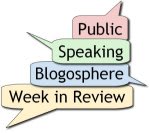Editor’s Note: As I watched the video contained in this article, my 7-year-old daughter peered over my shoulder and proclaimed “Dad, she’s doing bad stuff.”
True, but sad, since so many speakers perpetuate these communication barrier habits. I invited the video’s creator — Stacey Hanke — to share it with Six Minutes readers, and here is her article for you.
Most individuals are unaware of the static they create when they communicate. What do I mean by static? Static is created when what you say is inconsistent with how you say it.
For example, suppose you’re having a conversation and the other person says, in a boring, monotone voice, “I’m so excited to have this opportunity to work with you.” Their facial expressions are lifeless. They never look you in the eye while they’re fidgeting with a pen. Most likely you’d question their credibility and knowledge, and not take action on what they have to say.
This article will increase your awareness of the static you are creating for your listeners, and give you practical, immediate tips to have more impact and influence.
Continue Reading »







































